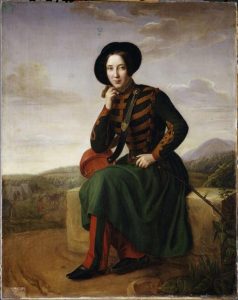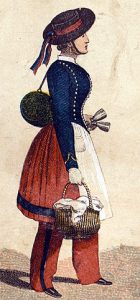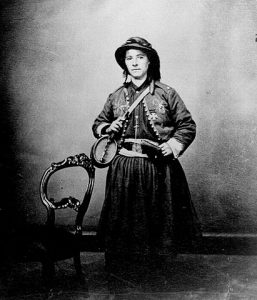Vivandières
If you've spent any time here on the Margins in recent years, you know I've been thinking about women warriors. One thing I've learned in the process is that women have always been a part of war, whether or not they picked up a weapon or led a charge.
From the sixteenth through the mid-nineteenth centuries, women were always a critical part of European armies, though not as soldiers. They cooked, did laundry and mending, nursed the wounded, and scavenged the battlefield for useful gear when the fighting was over. The British army described them as "women on the ration”—such women may have accounted for as much as ten percent of the British force in the American Revolution. The numbers varied by the type of unit: artillery units, for instance, which as we have seen needed support on the battlefield, tended to have larger numbers of women than other units. Such women were often the wives, or at least permanent female companions, of enlisted men.(1) Some armies also tolerated women "off the rations”—prostitutes, grog vendors, fences for plundered goods— as long as they did not disturb camp discipline. But that's a different story.
Vivandières were a last-gasp variation of "women on the ration". They first appeared in the French army shortly before the Napoleonic wars, after efforts to outlaw the presence of women in army camps. They continued as official auxiliaries of the French army until 1906.(2) A small number of women also filled this role, in a less official capacity, in the American Civil War.
Like their predecessors, they were often married to a member of the regiment and they traveled with the army. They were attached to specific regiments. Although they did not wear uniforms in the sense of officially mandated apparel, they often wore unofficial uniforms loosely based on those worn by Zouave units (3)--the defining feature being a practical pair of trousers worn under a short skirt. (A uniform that Civil War nurses may have looked at with envy.) Their official job was to sell alcohol, tobacco and other comforts to soldiers--a pragmatic recognition on the part of nineteenth century armies that their own supply systems were inadequate. Unofficially, vivandières carried water, bore colors, mended clothing (for a fee) and served as nurses on the battlefield.
And, yes, sometimes they fought alongside the men they served with.
(1) Officers' wives often accompanied armies as well. Their role was even less clearly defined.
(2) The end of the vivandières as an official auxiliary was part of the military reforms instituted in France in the aftermath of the Dreyfus Affair.
(3) The Zouaves were light infantry units in the French army that primarily served in French North Africa. They had a reputation for reckless bravery and wore distinctive uniforms modeled on those of North African troops. Units in other nineteenth century armies, most notably units on both sides of the American Civil War, adopted the colorful uniforms, presumably hoping that Zoave uniforms would come with Zoave courage attached.
Sir Richard Burton: Not the Actor, the Other One
Recently I had cause to pull a biography of Sir Richard Francis Burton (1821-1890) off my to-be-read shelf, where it has sat since 1990. I originally bought it because I was writing my dissertation on the way the definition of the Orient changed over time with increasing exposure to the non-Western world and Burton was one of the men who translated the Arabian Nights into English in the nineteenth century. I also bought it because I've long been fascinated by the geographical explorers of the nineteenth century.(1)
I will probably never read it.(2) Looked at almost thirty years later(3), the sub-title alone is enough to put me off: The Secret Agent Who Made the Pilgrimage to Mecca, Discovered the Kama Sutra, and Brought the Arabian Nights to the West. Because, no, no and no.
- Burton wasn't the first European to make the pilgrimage to Mecca disguised as an Arab. Ludovico di Varthema beat him by three centuries. He wasn't even the first Englishman to do so. And he didn't make the hajj as a "secret agent." Like many other European explorers of the period, he was funded by the Royal Geographical Society. The Royal Geographic was in it for the knowledge. Burton was in it for the adventure.
- Burton certainly didn't "discover" the Kama Sutra, which was never lost. He was the first to publish an English translation. The so-called Burton translation owed a great deal to Burton's largely forgotten collaborators: British traanslator Forster Fitzgerald Arbuthnot and two Indian scholars, Bagavanlal Indrajit and Shivaram Parashuram. (I am, however, prepared to give Burton full credit for the substantial distortions of the text that appear in the translation since they are in keeping with everything we know about him. If you're interested in learning more, I refer you to Wendy Doniger's Redeeming the Kama Sutra.)
- Burton wasn't the first man to translate the Arabian Night into a European language. French linguist Antoine Galland published twelve small volumes of what he named the Thousand and One Nights between 1704 and 1717. For the English-speaking audience, the first volumes of the Thousand and One Nights appeared in 1706, in an anonymous translation from Galland under the name The Arabian Nights Entertainments. Known as the "Grub Street" translation, it remained in print almost continuously for a century. Richard Burton’s infamous 15-volume translation—10 volumes of text and five volumes of notes—appeared in 1885 and 1886. It certainly didn't replace Galland in the hearts of the reading public, because it was virtually unreadable. (FYI: not every one agrees with me on this point.)(4)
And yet the exaggeration in that sub-title is central to the aspects of Burton that captured the imagination of his contemporaries and continues to capture ours. He was a skilled linguist, a reckless adventurer, a polymath, and a master of self-promotion.
After he was kicked out of Oxford for refusing to be contrite about multiple infractions of the rules, he went to India as a junior officer in the 18th Regiment of Bombay Native Infantry.(Because of course the army is a good career for a hard-core rule-breaker.) He was already fluent in French, Italian (including a couple of Italian dialects), Greek and Latin. Once in India, he added Arabic, Hindi and a number of other South Asian languages to his toolbox. (By the end of his career, he spoke between twenty-five and forty languages, depending on where you draw the line between language and dialect. Are you feeling like a slacker yet?) As a result of his fluency in languages and his willingness to disguise himself as a Muslim trader, he became an intelligence officer for Sir Charles James Napier, a general in the British Indian Army and later the governor of the province of Sindh, in what is now Pakistan.(5) On one expedition for Napier, he infiltrated the homosexual brothels in Karachi and produced a detailed report on their operations that led to the end of his career when it fell into the hands of an officer who was not a Burton fan. (I suspect there were many of them. )
With his army career in tatters at the age of 29, Burton turned himself into a professional explorer/adventurer whose books about his travels made him famous. In addition to making the hajj, he traveled to the forbidden East African city of Harar (1854), searched for the source of the White Nile (1855), led an expedition inland from Zanzibar (1857-58), and visited the Mormon capital of Salt Lake City in 1860--as distant and exotic as Timbuktu as far as his British readers were concerned. His accounts of his travels are a combination of adventure and ethnography, with a strong interest in the sexual practices of the places he visited, the more lurid the better. The books are vivid, opinionated, clever, and marred for a modern reader by the deeply rooted racism of his time. (Personally, I find his opinions about women hard to swallow as well.)
In 1861, he married Isabel Arundell and did his version of settling down, which meant joining the British Foreign office and serving as consul in places that allowed him to enjoy adventures on a smaller scale, and write about them for his eager audience. (The Foreign Office was not amused about the books.)
His final assignment was the consulate at Trieste, a comedown for an aging adventurer. He arrived at Trieste in 1872 and remained until his death. At Trieste, he wrote on a wide variety of topics and emerged as a translator of some note. (Though I do wonder how many unacknowledged collaborators were involved.) After his death, his wife burned his diaries, presumably in an effort to protect his reputation, and wrote a biography in which she tried to turn Britain's favorite bad-boy adventurer into an ideal Victorian gentleman.
Over the course of his life, Burton published 43 books on his explorations and other topics and almost thirty translations. Feel like a slacker now? Me, too.
1) Several decades of fascination later, I recommend Heinrich Barth as the most fascinating of them all
2) Though I will keep it for reference because giving away historical non-fiction and biography always comes back to bite me.
3) Thirty? Really?? (Pardon me while I stop to check that.) Dang! I've been thinking about this stuff for a long time now.
4) Galland is a hobby-horse of mine. If you want to know, you can read my article on the subject here.
5) Napier is best known for the kind of multi-lingual pun that I wish I could make. Having conquered the province of Sindh, he sent a one-word dispatch to his superiors that read "Peccavi"--the Latin for "I have sinned". (Say it out loud.) This may simply be a bit of comic-book history. Some scholars believe it was invented by the humor magazine Punch. A pity. Like most comic-book history, it is emotionally satisfying even if untrue.
Shin-kickers From History: Margaret Chase Smith
A blog post about Senator Margaret Chase Smith (1897-1995) could easily consist of nothing more than a collection of the trenchant remarks with which she skewered political opponents, reporters, and occasionally herself:
- Speaking against Senator Joseph McCarthy's scare tactics: "I don't want to see the Republican Party ride to political victory on the four horsemen of calumny--fear, ignorance, bigotry and smear."*
- On her presidential campaign in 1964: "When people keep telling you that you can't do a thing, you kind of like to try it."
- In a speech on civil rights: "We should not permit tolerance to degenerate into indifference."
- "Strength, the American way, is not manifested by threats of criminal prosecution or police state methods. Leadership is not manifested by coercion, even against the resented."
- "Those of us who shout the loudest about Americanism, are all too frequently those who…ignore some of the basic principles of Americanism--the right to criticize, the right to hold unpopular beliefs, the right to protest, the right of independent thought."
Known as the "Quiet Woman from Maine" and the "conscience of the Senate," Smith was the first woman to be elected to both houses of Congress and to be nominated for president on the floor of a national convention. (She was supported by 27 delegates at the Republic National Convention in 1964.) She is best known for being the first Senator to denounce Joseph McCarthy's red-baiting tactics on the Senate floor.
Like many women who entered politics in the twentieth century, she took what political scientists have described as the "widow's walk to power," in which a woman steps into a position of political power after her husband's death. Her husband was elected as the representative to the House from Maine's Second Congressional District in 1937. When he suffered a serious heart attack several years later, he asked the voters to continue to his policies by electing Smith to replace him--the classic reasoning that results in the "widow's walk to power." She was elected to fill the unexpired term in a special election. Thereafter she was elected in her own right. She served four terms in the House of Representatives, from 1941 to 1949, and then four terms in the Senate, through 1975. She was a lifelong Republican who voted her conscience rather than the party line and made enemies from both ends of the political spectrum.
It takes a special politician to piss off both the Communist-hunting Senator Joseph McCarthy and Soviet leader Nikita Krushchev. We need more like you, Maggie.
*Part of a speech known as the "Declaration of Conscience." McCarthy responded by calling Smith and the six Republican Senators who supported her "Snow White and the Six Dwarves."




